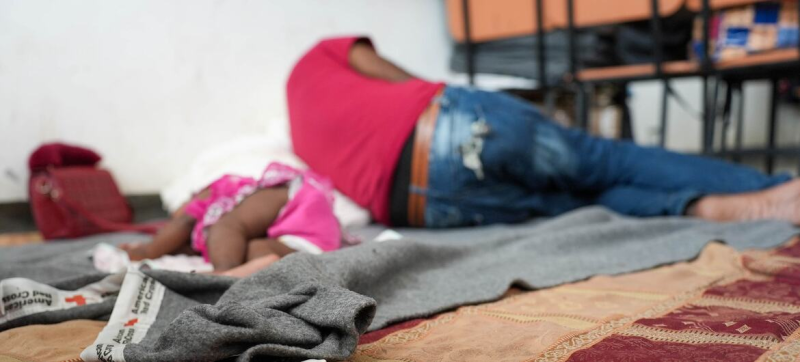- Puppet show enchants Children as Boi Mela comes alive on day 2 |
- DSCC Admin Salam’s drive to make South Dhaka a ‘clean city’ |
- 274 Taliban Dead, 55 Pakistan Troops Killed |
- Now 'open war' with Afghanistan after latest strikes |
- Dhaka's air quality fourth worst in world on Friday morning |
Violence Displaces Millions in Haiti and DR Congo: UN

An adult and child rest at centre for displaced people in Haiti.
The UN humanitarian affairs office (OCHA) has stressed the urgent need to scale up support for displaced families in Haiti amid ongoing violence and insecurity.
Displaced Haitians are now spread across 250 active displacement sites nationwide, most of which are informal. Just over one-fifth of these sites are managed by humanitarian organisations, meaning many people are living in precarious conditions.
In June alone, more than 200 alerts were reported across these sites, with over 80 per cent related to essential needs such as food, water, shelter, or healthcare.
OCHA noted that nearly 1.3 million people are now internally displaced in Haiti—the highest number ever recorded in the country due to violence.
The UN and its partners have provided more than 113,000 displaced Haitians this year with essential services, including water, shelter, sanitation, and healthcare.
However, the humanitarian response remains severely constrained by limited funding and ongoing insecurity, which hinder access to affected areas and delay the delivery of aid.
Despite these challenges, the UN continues to work with Haitian authorities and humanitarian partners to coordinate relief efforts and mobilise additional resources to support displaced communities.
In the eastern Democratic Republic of the Congo (DRC), ongoing violence in North and South Kivu provinces continues to claim civilian lives and displace communities.
In North Kivu, UN partners on the ground in Rutshuru and Lubero reported that fighting between M23 and other armed groups persisted until Tuesday, resulting in eight civilian deaths and the displacement of 42,500 people as of earlier this week.
Since early July, heavy clashes in South Kivu have also displaced at least 37,000 people, according to local partners.
The surge in violence is increasingly restricting humanitarian access. While aid partners are working to sustain services, access limitations and funding shortages pose major obstacles.
A humanitarian convoy planned by OCHA along the road between Bukavu and Uvira, scheduled for this Friday, was postponed due to a lack of security guarantees.
Many UN partners have been forced to scale back operations, disrupting essential services. OCHA has called on the international community to urgently address funding shortfalls and help prevent a worsening humanitarian crisis.
The UN Secretary-General has appointed a 21-member independent scientific panel to examine the physical and societal consequences of nuclear war on local, regional, and global scales in the days, weeks, and decades following such an event.
Established under a General Assembly resolution, the panel’s formation comes amid warnings that nuclear risks are at their highest since the Cold War, UN Deputy Spokesperson Farhan Haq said on Friday.
The panel will consult with international and regional organisations, the International Committee of the Red Cross (ICRC), civil society groups, and affected communities.
Their first meeting is scheduled for September, with a final report to be submitted to the General Assembly in 2027.

